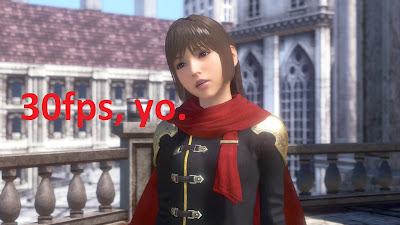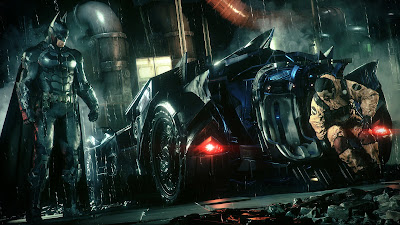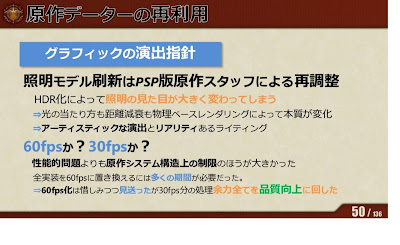There are few things that rile up vocal gamers as much as the number of frames they get for every second they look at their screen. "Give me 60fps or give me death!" they proclaim before, presumably, wrapping their mouse cord around their neck and hanging themselves; a 30fps lock for them is unthinkable.
A
cursory examination of their hastily scrawled departing message reveals
discontent with input lag deficiencies at 30fps and ghosting, motion blur,
overdrive artefacts and choppy animation making games "unplayable".
"I simply can't play a game at 30fps" they insist, to which I say
"I don't believe you" (nor do the millions of consumers playing games
fine at 30fps). For all their talk of a 30fps cap being developer laziness I
can't help but detect a hint of laziness in the gamer who makes no effort to acclimatise to a lower framerate: they are confusing their
willingness to play at 30fps for their ability to.
The
stigma around 30fps locked games has coalesced into a movement spurned on my
videogame critic/Youtube personality TotalBiscuit, going by the tongue-in-cheek
title "The Framerate Police". And whilst I can't fault the majority
of the arguments he puts forward in his video (60fps is advantageous over 30fps for multiple
reasons) or the effort to organise and centralise information on fps caps
(these are things that are good to know) I can't help but feel the case for
60fps is just as arbitrary as the one against 30: it’s all a matter of
perspective.
Recently
I played through Doom 3 BFG Edition (PC), an enlightening experience
from a framerate perspective as the compendium features the first 2 Doom games
from the 90s which, despite their blistering pace and responsive controls, top
out at a humble 35fps. More importantly the collection also includes a modified
version of Doom 3 which, in contrast to its 30fps original release, can
run as high as 120fps. And 120fps is a transformative experience; I'm almost
entirely certain that the improved responsiveness in the controls did, in fact,
change my whole goddamn life. Oh wait, no, nevermind. It didn't. My bad.
But
in all seriousness, after dropping back to 60fps I found all the arguments
against 30fps applied to 60fps as well: Less responsive controls? Check.
Animation appearing choppy? Check. A lack of clarity in motion? Check. Sudden,
overwhelming urge to kill myself in a hysterical rage of anti-60fps sentiment?
Che-wait, no. That didn't happen either.
If
we are going to take issue with framerates locks then it should be over the implementation
of framerate locks at any framerate, anything less fails to address the issues
cited with 30fps: again, it’s simply a matter of perspective (and those who
only have 60 Hz monitors lack that perspective). But these arguments, which
deal with the objective shortcomings of 30fps aren't what I really want to
address here. After all, although the arguments against 30fps might only hold
weight in relative terms, they still hold weight. Instead, I want to address a
bizarre anti-30fps sentiment that doesn't come from any logical reasoning, but
a confused pro-consumer stance that's lost sight of why a PC port capped at
30fps is considered outrageous in the first place.
Recently
Square Enix shed some light on the PC version of Final Fantasy Type-0 HD
but without any reference to framerate. Inquisitive gamers and some
publications chased Square Enix's Twitter account up on the matter to be told
that the game would indeed feature a framerate cap. And although no specific
mention of a 30fps cap was made it was assumed the game would be capped at
30fps.
The
response from many corners of the internet was predictable, and disappointingly
so. Here are just some excerpts from around the web: "WTF!! I swear, these
devs don't care about PC ports. Yeah, I'm not getting it. Laziest thing
ever", "lol) No thanks
then)", “When companies FPS lock their console to PC port it says much
about how little work they had to do”, “Locked @ 30fps then no sale”.
There’s an assumption amongst these
consumers that a 30fps lock is somehow indicative of a lazy or poorly optimised
port. In other words, to invest in a 30fps locked PC game would be tantamount
to willingly supporting the proliferation of sub-par products. Put in its most
extreme form: A 30fps lock is the telltale sign of a hostile publisher with an
anti-consumer stance that consumers need to meet with indifference or outright
contempt.
This attitude isn’t entirely bereft of logical grounding either. The recent PC port of Batman: Arkham Knight shipped with numerous issues prompting some to dub it Batman: Arkham Shite. These issues ran the gamut, from visual effects from the console versions being entirely absent, substantial hitching and stuttering on machines that matched or exceeded the recommended specifications and, topping it off, an arbitrarily placed 30fps lock that users could circumvent with a simple .ini tweak.
This attitude isn’t entirely bereft of logical grounding either. The recent PC port of Batman: Arkham Knight shipped with numerous issues prompting some to dub it Batman: Arkham Shite. These issues ran the gamut, from visual effects from the console versions being entirely absent, substantial hitching and stuttering on machines that matched or exceeded the recommended specifications and, topping it off, an arbitrarily placed 30fps lock that users could circumvent with a simple .ini tweak.
Now, I’d hesitate to call Iron Galaxy,
the 12-person studio behind porting Arkham
Knight “lazy”, instead placing the blame squarely at publisher Warner Bros.’
feet for giving the studio an unreasonable timeframe to get the port completed
– but whether you attribute it to laziness or poor judgement the end result is
the same from the consumer’s perspective; a sub-par product that fails to take advantage
of the strengths of the PC platform. And worse, one in a very, very long line of them.
For western developers, many of whom cut
their teeth on PC game development before joining (and later supplanting) their
Japanese counterparts on console, tying game logic to framerate wasn’t a done
practice, making any fps locks arbitrarily placed and trivial to overcome had
the developers put in a little effort. Sometimes the effort needed being
exceptionally small, such as the aforementioned Arkham Knight .ini tweak (followed up with some basic testing).
In this development culture, the
development culture to which PC gamers are accustomed, a 30fps lock is an
indication that the developer or publisher didn't care enough to put in the
minimal effort required to improve the PC version over the console release. And
if they couldn’t be bothered to do that the chances were the game was broken
elsewhere and post-launch support would be non-existent as well (along with a
host of other issues and disappointments). It was a sign that the publisher had
little respect for its PC consumers or the PC as a platform.
So a 30fps lock is symptomatic of poor
port when considered in the above context; a short-hand that consumers can use
to out cavalier publishers. But Final
Fantasy Type-0 HD isn’t part of this development culture. The original
version of Final Fantasy Type-0 (on
which the HD remaster is based) is a Japanese game that was developed
exclusively with the PSP in mind, and one where framerate was tied to game
logic in such a way that removing the 30fps restriction would be a non-trivial
development challenge.
In fact key members of the team that
handled the HD conversion, the Osaka-based Hexadrive, have made just this
point, suggesting that the
optimisation effort in getting the game running in 60fps for the PlayStation 4
and Xbox One releases would have been trifling in comparison to the effort
required to overhaul restrictions built into the base systems behind the game.
It should be noted that this statement
was made to an audience of technically-minded game developers at Kansai CEDEC
(Computer Entertainment Development Conference) 2015 in a presentation by Hexadrive’s
Chief Technical Programmer Junichi Iwasaki. CEDEC is a developers’ conference,
not a press or publically open event so it’s not the case that Iwasaki was
being a 30fps apologist or exaggerating the capabilities of this generations’
home consoles for the sake of keeping face or selling a product. He has no
reason (and no means) to fool a crowd of people who know their way around
Reverse Reprojection Caching and Scalable Ambient Obscurance. Iwasaki is
telling the truth here: Final Fantasy
Type-0 HD has non-trivial limitations locking it at 30fps and overcoming
them would be outside of the scope of a remaster.
The long and short of it is that it’s
not reasonable to expect Final Fantasy
Type-0 HD to run at 60fps for genuine reasons rooted in the culture and
development of the original game. It was short-sighted of Square Enix to
develop the game in this way, and perhaps indicative of the myopic,
Japan-centric view the publisher was dragging into the late 2000’s.
TotalBiscuit is right in saying that developers probably shouldn’t tie game
logic to framerate in the first place, but unless you have a time machine that’s
little consolation for PC ports of games that have their roots in the past.
But this is important to point out all
the same because it’s this development culture context behind the 30fps
cap that's important in deciding whether the publisher's stance is hostile to PC
consumers (which would make a case for outrage driven by pro-consumer
sentiment), not the presence of the lock itself. Consumers aren't being tricked
or coaxed into buying a sub-par product. It’s not the case that a 60fps version
of Type-0 HD is sitting around on a hard
disc at Square Enix HQ somewhere, arbitrarily held back by a dastardly Square
Enix CEO (the dastard!).
Whereas I can understand that
consumers who may have already experienced the game at 30fps on console may see
no reason to purchase the PC version without a higher framerate justifying
double-dipping, I can’t help feel but that those against 30fps locks on principle have
lost sight of why a 30fps lock is contentious in the first place. Their stance
isn’t justifiable from a pro-consumer standpoint, smacking of misguided
entitlement. Their protest of not buying the game, ultimately, little more than willfully opting for the 0fps version of the game.



No comments:
Post a Comment